
Rahul Jayaram teaches at the School of Film, Media and Creative Arts, R V University, Bengaluru @rahjayaram
Credit: Special Arrangement
At a recent concert in Bengaluru, Sonu Nigam equated those soliciting him to sing in Kannada as the reason why events like the Pahalgam attack happened. At first, he defended his actions. He cited his 51-year old age status which he claimed permitted him to have a take-no-prisoners approach to life. As the backlash against him gathered headwinds wherein even institutions such as the Karnataka Film Chamber of Commerce rapped him and removed his song from a film, the blustering Nigam whimpered apologies, offering regrets for what he said and deleted his abrasive initial posts on X. He apologised under duress when crisp slices of his bread and fresh butter seemed set to be snatched away.
Courtesy of his imbecilic outburst, Nigam once more exposed the tenuousness of the idea of Indian unity lending substance to the perception amongst Kannadigas and non-northerners of the hubris of the Hindi-speaking north. Most important, the Kannada language and its speakers had made him a State icon, a cultural rarity for any non-native speaker, and yet he chose to scrape at the hand that fed him. The
subcontinent is febrile as you read this. Yet we mustn’t forget these current waves of hyper-nationalism get filtered across non-Hindi speaking lands also as Hindi chauvinism. Nigam’s deafness of metaphorical tonality stands in such contrast
to the deftness of his musical
tonalities as a singer.
Nigam’s on-stage eruption is so telltale of an outlook it may risk stereotyping northerners. He assumed India and Indians invariably spoke as one, and that his popularity accorded him status to lecture on nationalism. Nigam was an early supporter of the current Central government, its leadership, and cultural imperatives that have effected a northern Indian consolidation, through dog whistles, sectarian targeting, and the like. Ironically, even if states as Karnataka may have large sections that support hard-line Hinduism, Nigam’s behaviour has affronted them too. Language identity, even today, so often precedes religious or other identities.
There are further oddities about what happened and they permit one to take a deeper under-explored view. Sonu Nigam is a major Hindi male playback singer who has dominated male playback singing in Kannada cinema over the last 15 years. In the past, there were musical jewels such as S P Balasubrahmanyam, K J Yesudas, S Janaki, and Vani Jairam from the south, especially the first two, who had some good moments delivering hits in Hindi. But by and large, they remained Southern miracles.
Hindi’s cultural power and reach transported several of their musical gems in the golden era of Indian cinema across all parts of India. Decades of such spread enabled a cultural crossover like Sonu Nigam turning into a successful Kannada singer. Why doesn’t the reverse happen? When did a Kannada artist prospering in Kannada first go on to flourish in Hindi later on? Why couldn’t Hindi audiences accept Hindi songs being sung in a southern accent, while a Nigam could croon his way into Kannada hearts touched by Hindi shadings? Surely, there is a power differential here. On the other hand, I’ve often wondered how Sonu Nigam got off the charts among Kannadigas who pride themselves on their art, culture, music et al. Couldn’t Kannada cinema scope out and then bolster a homegrown talent? It’s a vexed query: on one hand, it proves the State’s relatively accommodating nature, and on the other, it makes one ponder how it shepherds and protects its native potential.
Nigam, most likely, may not have been aware enough to comprehend what circumstances and unnoticed power asymmetries propelled him to Kannada singing stardom. Which is why his comments smack of majoritarian condescension, and Karnataka taught him to maintain a gratitude journal.